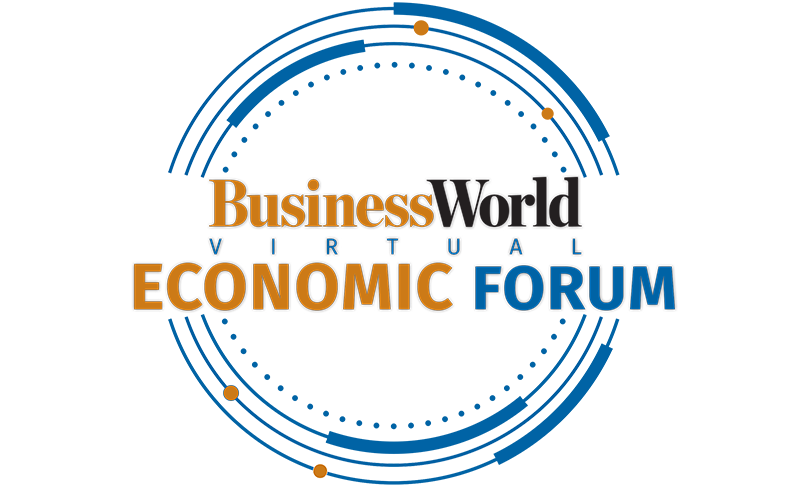
THE BusinessWorld Virtual Economic Forum, the newspaper’s flagship and award-winning event, is set to open today with the theme, “Forecast 2021: ReBoot. ReThink. ReShape.”
The two-day forum, which goes online for the first time this year, will feature insightful keynote speeches, conversation panels, fireside chats, breakout sessions, “Ask the Expert” talks, virtual exhibits, and business networking.
Keynote speakers include Børge Brende, president of the World Economic Forum, and Bernardo Mariano, Jr., chief information officer of the World Health Organization (WHO), for today’s forum; and Ndiamé Diop, World Bank country director for Brunei, Malaysia, Philippines and Thailand, and Kelly Bird, Asian Development Bank country director, on Nov. 26.
DAY 1 (NOV. 25)
The Conversation Panel, with the topic “Responding to the Pandemic”, will feature Karl Kendrick T. Chua, acting secretary of the National Economic and Development Authority; Dr. Selva Ramachandran, resident representative of UNDP Philippines; Michael Peiyung Hsu, representative of Taipei Economic and Cultural Office in the Philippines; Dr. Edsel T. Salvaña, director of Institute of Molecular Biology and Biotechnology, National Institutes of Health University of the Philippines Manila; and Guillermo Mr. Luz, chief resilience officer of Philippine Disaster Resilience Foundation.
For the fireside chats, Jean-Antoine Zinsou, country general manager of Sanofi Pasteur Philippines, will discuss the race for a vaccine, while Bank of the Philippine Islands President and CEO Cezar P. Consing, will talk about banking in the new normal. Palafox Associates Principal Architect and Founder Felino A. Palafox, Jr. will discuss how cities will be reshaped by the crisis.
For the first breakout session, attendees can choose between “Bright Spots: The Future of Travel and Tourism” or “On the Rise: E-Commerce and Logistics.”
Tourism Secretary Bernadette Romulo-Puyat, World Travel & Tourism Council Vice President Tiffany Misrahi, PwC Philippines Chairman and Senior Partner Alexander P. Cabrera, and AirAsia Philippines CEO Ricardo P. Isla will discuss developments in the tourism industry.
Meanwhile, Martin Cu, country head of Ninja Van Philippines; Ramakrishna Maganti, senior vice-president for marketing and innovation of Holcim Philippines; and Ray N. Alimurung, CEO of Lazada Philippines will talk about the e-commerce industry.
In the second breakout session, guests can attend “The Youth Market: Marketing to Gen Z and Millennials Post-COVID” or “High-Tech and Secured: IT and Cybersecurity in the Post-COVID Era.”
Gary C. de Ocampo, CEO of the Insights Division of Kantar Philippines; Pauline G. Fermin, managing director of Acumen Strategic Consulting, Inc.; and Elly V. Puyat, CEO of Ogilvy & Mather Philippines, will talk about marketing trends.
National Privacy Commission Chairman Raymund E. Liboro; Angel T. Redoble, first vice-president and chief information security officer of ePLDT Group, PLDT Group, and Smart Communications; and Andres Jomas Capellan, security services sales leader at IBM Philippines will discuss cybersecurity.
For the “Ask the Expert” session, Kristine A. Romano, managing partner of McKinsey & Company, Philippines, will answer questions from the audience.
DAY 2 (NOV. 26)
For the CEO Panel, top business leaders Ayala Corp. Chairman and CEO Jaime Augusto Zobel de Ayala, Manila Electric Co. President and CEO Ray C. Espinosa, and Magsaysay Group of Companies President and CEO Doris Magsaysay-Ho will discuss leadership and the country’s road to recovery.
Fireside chats will feature Bangko Sentral ng Pilipinas Deputy Governor Francisco G. Dakila Jr., who will talk about monetary policy; Willis Towers Watson Philippines Head James Matti, who will discuss the workforce of the future; and Bain & Company Asia-Pacific Regional Managing Partner Satish Shankar, who will discuss consumption trends.
The first breakout session will feature two panels: “Reimagining Mobility: How COVID-19 will Change Transportation and Connectivity” or “What We Need: Ensuring Food Security and Boosting the Agriculture Sector.”
The mobility session will include Christophe Vicic, country head of JLL Philippines, Inc.; Alfredo S. Panlilio, president and CEO of Smart Communications, Inc. and chief revenue officer of PLDT, Inc.; and Dr. Ting Wu, partner at McKinsey & Company, China.
Issues facing the agriculture sector will be discussed by Shahidur Rashid, director for South Asia, International Food Policy Research Institute; Paul Teng, senior fellow and adviser in food security at S. Rajaratnam School of International Studies; and Tamara Palis-Duran, assistant representative for Programmes at Food and Agriculture Organization of the United Nations.
The second breakout session will feature two topics: “Accelerating Digital Transformation” or “Towards a Cashless & Contactless Digital Payment Ecosystem.”
Discussing digital transformation will be Jeremiah B. Belgica, director-general of Anti-Red Tape Authority; Khor Chern Chuen, chief operating officer of SAP Southeast Asia; and Dorjee Sun, CEO of Perlin.net and co-founder of International Chamber of Commerce AOKpass.
Panelists for the digital payments session include Eduardo V. Francisco, president of BDO Capital & Investment; Martha M. Sazon, president and CEO of GCash; Hans B. Sicat, country manager of ING Philippines; Paolo Azzola, COO of PayMaya Philippines; and Mamerto E. Tangonan, digital payments expert.
Anthony Oundjian, managing director and senior partner at Boston Consulting Group (BCG), will take questions from the audience in the “Ask the Expert” session.
Attendees will receive free or discounted copies of the latest issues of BusinessWorld In-Depth — BusinessWorld’s on-demand digital magazine; Top 200 Consolidated Corporations in the Philippines; and the Quarterly Banking Report.
Held annually since 2016, the BusinessWorld Economic Forum serves as a platform for industry leaders and key figures in the society to tackle key issues and challenges affecting the country.
BusinessWorld Virtual Economic Forum is presented by BusinessWorld Publishing Corp., with co-presentor LT Group, Inc.; gold sponsors BDO, Globe Telecom, San Miguel Corp., SM Investments Corp.; silver sponsors Alveo, DivinaLaw, Meralco, Stradcom, Toyota, Turkish Airlines, and Vista Land; bronze sponsors Ayala Corp., Century Properties, Federation of Filipino-Chinese Chambers of Commerce & Industry, Inc., First Gen Corp., PAGCOR, Philex Mining Corp., Mega Global Corp., PLDT, Smart, Sanofi, and SGV & Co; and donor NutriAsia.
The event is open to BusinessWorld subscribers, readers, and the public. To register and for more information about the program and the access passes available, visit www.bworldonline.com/BWVirtualEcoForum


